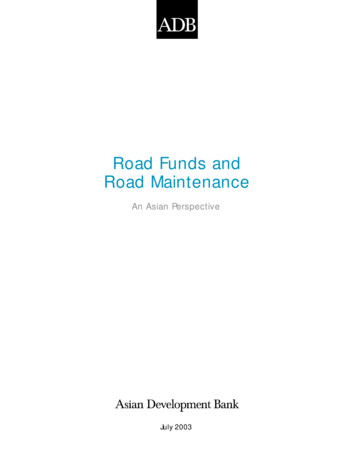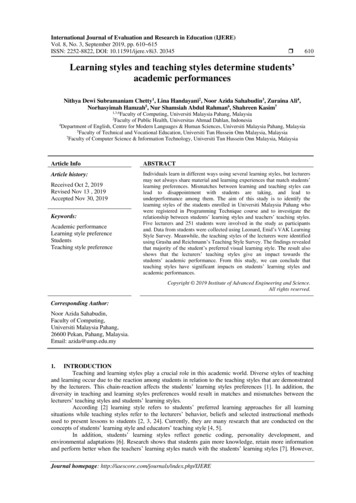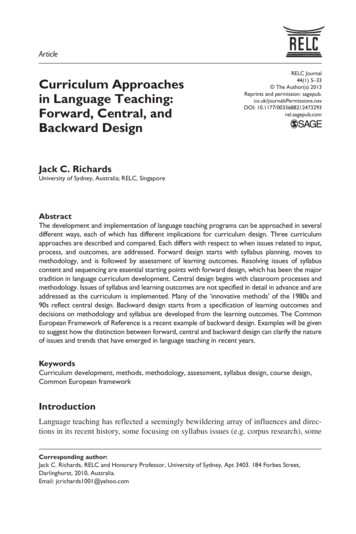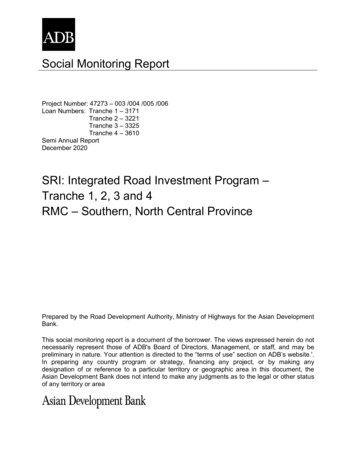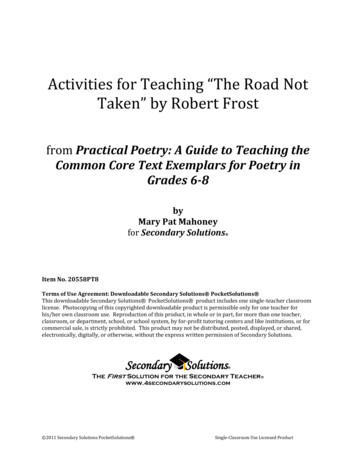
Transcription
Activities for Teaching “The Road NotTaken” by Robert Frostfrom Practical Poetry: A Guide to Teaching theCommon Core Text Exemplars for Poetry inGrades 6-8byMary Pat Mahoneyfor Secondary Solutions Item No. 20558PT8Terms of Use Agreement: Downloadable Secondary Solutions PocketSolutions This downloadable Secondary Solutions PocketSolutions product includes one single-teacher classroomlicense. Photocopying of this copyrighted downloadable product is permissible only for one teacher forhis/her own classroom use. Reproduction of this product, in whole or in part, for more than one teacher,classroom, or department, school, or school system, by for-profit tutoring centers and like institutions, or forcommercial sale, is strictly prohibited. This product may not be distributed, posted, displayed, or shared,electronically, digitally, or otherwise, without the express written permission of Secondary Solutions.SecondarySolutions The First Solution for the Secondary Teacher www.4secondarysolutions.com 2011 Secondary Solutions PocketSolutions Single-Classroom Use Licensed Product
NamePer.“The Road Not Taken” by Robert FrostAuthor Biography and Historical ContextRobert Frost believed in the power of poetry. In an essay titled ―Education by Poetry,‖he wrote: ―The person who gets close enough to poetry, he is going to know more aboutthe word belief than anybody else knows.” Robert Frost must have been speaking abouthis own experiences with poetry, as it was a central part of his life.Robert Frost lived from 1874 – 1963. Though he was born in San Francisco, he movedback to his family’s home in New England after his father died when he was a youngboy. Both his mother and grandfather were teachers who made sure Robert read a widevariety of materials.As a young man, Frost attended Dartmouth College and Harvard, but he didn’t graduatefrom either. Instead, he worked as a farmer, an editor, and a schoolteacher. As a youngman, he wrote in his spare time, but his poems were rejected for publication. When hisfirst poem was published in 1894, he was paid 15 for it.In 1911, he decided to move to England in hopes of getting his poetry published there.By this time, he was married and had children. In England, he met other poets. Hisfirst book of poetry was published in England in 1913, and it was well received. When hereturned to the United States, he was surprised by the favorable American reviews of hispoems. The same publishers who had rejected his poems years before were now askinghim for his poetry! He continued to teach and received invitations to lecture and readhispoetry throughout the country.In 1924, 1931, 1937, and 1943, he won the Pulitzer Prize for poetry. He was appointedthe Consultant in Poetry to the Library of Congress (which is called the Poet Laureatetoday). Additionally, throughout his life, he received forty-four honorary degrees andnumerous awards including a Congressional gold medal in 1960 for his poetry. There iseven had a mountain in Vermont named after him. In 1960, he was asked to read at theinauguration of President John F. Kennedy – the first time such an invitation had beenextended to a poet.Robert Frost’s work is still extremely popular today. His poems deal with simple eventsand rural settings. Often the topics and dialect are unique to the New England region.While the topics of his poems may be simple, like a road in the case of The Road NotTaken, they contain insight into human nature and life.Historical BackgroundWhat is the Pulitzer Prize?Joseph Pulitzer was a man who embodied the American dream. He was born inHungary, moved to America, and through hard work and determination, built asuccessful newspaper that created standards in journalism. In his will, he establishedthe Pulitzer Prize. The prize would be awarded each year for journalism, history, andbiography. Later, awards were added for poetry, music and photography. The PulitzerPrize is considered a great honor by all who receive it. 2011 Secondary Solutions PocketSolutions Single-Classroom Use Licensed Product
NamePer.A Poet at the Presidential InaugurationJohn F. Kennedy invited Robert Frost to speak at his inauguration on January 20, 1961.Like many people of the time, Frost was excited by the energy and enthusiasm the newpresident promised to bring to the country. Frost wrote a poem for the occasion calledDedication. However, Inauguration Day was bright and sunny, and an elderly Frosthad difficulty reading the printed copy of the poem. After an attempt to read his newpoem, Frost instead recited the poem The Gift Outright from memory.Exploring Expository Writing: Author Biography and Historical ContextDirections: Use the information you learned in the article about Robert Frost toanswer the following questions on a separate piece of paper.1. When and where did Robert Frost live?2. What kinds of careers did Robert Frost have in order to support his family?3. How do you know that Robert Frost was dedicated to writing poetry?4. What do you think might have been one of the best awards or honors Robert Frostreceived in his lifetime? Why do you think that?5. Why do you think he chose to write about topics such as rural life and life in NewEngland?6. Read the quote at the beginning of the article. How do you think Frost felt aboutpoetry? Why do you think that?7. Analyze what you think the word belief in the quote at the top of the article means.Explain your answer. 2011 Secondary Solutions PocketSolutions Single-Classroom Use Licensed Product
NamePer.“The Road Not Taken”Vocabularydiverged: branched off; moved in a different directionundergrowth: small trees and plants growing beneath larger treesfair: promising; favorableclaim: demand or righttrodden: walked onhence: from this timeComprehension CheckPart OneDirections: Paraphrase the poem using the graphic organizer below. Use thesentence prompts to help you.The speaker is in the woods and comes to a spot in the road where the road isforkedStanza 1The speaker is sorry He Until The speaker takes the other road which is Stanza 2He chooses this road because Because grass is growing on it, and the road seemed Though Both roads were The leaves Stanza 3The speaker saves the first road for But, the speaker knows that And the speaker doesn’t think 2011 Secondary Solutions PocketSolutions Single-Classroom Use Licensed Product
NamePer.Sometime in the future, the speaker will be At a time Stanza 4That two roads And he And that was Part TwoDirections: Answer the following questions using complete sentences.1. What is the speaker in the poem doing?2. What does the speaker encounter?3. What decision does the speaker have to make in the poem?4. Infer the season. How do you know?5. Describe the conflict the speaker feels.6. Explain why the reader doubts he’ll ever come back to travel the first road.7. Analyze the last stanza. What does the speaker mean by ―Somewhere ages and ageshence”? 2011 Secondary Solutions PocketSolutions Single-Classroom Use Licensed Product
NamePer.8. Formulate an idea of what you think the road may represent. Explain why you thinkthat.9. Propose a reason for the ―sigh” the speaker has at the end of the poem. What aresome of the reasons he may be sighing? Explain your answer.10. Propose a meaning for the line ―that has made all the difference.‖ What are some ofother meanings of that line?11. Which interpretation do you prefer? Why? 2011 Secondary Solutions PocketSolutions Single-Classroom Use Licensed Product
NamePer.“The Road Not Taken”Standards Focus: Setting and Extended MetaphorWhen is a road not a road?What setting are you in right now? Share your answers with a classmate.Did you write more than the physical space in which you are sitting? Setting includes:1. Geographical location – where in space the story takes place. Does the storytake place in a town, a classroom, a soccer field?2. The time period – when in time the story takes place. This can include theyear, era, or actual time.3. The emotional setting – what are the emotions associated with the setting?How are the emotions of being at a party different from the emotions experiencedat a visit to the dentist?4. The occupations or daily living conditions of the characters. What is thecharacter’s occupation or where does the character live each day? If the characteris a farmer, the living conditions of being on a farm are part of the setting.Part OneDirections: Using the scenes below, write a short description of each setting. Try toinclude the geographic location, the time period, the occupation/daily life of thecharacter, and an emotional condition. The first one has been done for you. (You maywish to fill in geographic location, time period, etc. before you write your scene.)Example: School: It is 8:30 a.m. and the halls of Happy Valley School are crowded onthe first day of school. Students are hurrying to class but are still excited to see thefriends they’ve missed during the break.a. Geographic location: Happy Valley Schoolb. Time period: 8:30 a.m., first day of schoolc. Emotional condition: excited; glad to see friendsd. Occupation/ daily life: students at school1. The mall:a. Geographic location:b. Time period:c. Emotional condition:d. Occupation/ daily life: 2011 Secondary Solutions PocketSolutions Single-Classroom Use Licensed Product
NamePer.2. The library, the week before exams:a. Geographic location:b. Time period:c. Emotional condition:d. Occupation/ daily life:3. Opening night of the school play:a. Geographic location:b. Time period:c. Emotional condition:d. Occupation/ daily life:4. The dentist’s office:1. Geographic location:2. Time period:3. Emotional condition:4. Occupation/ daily life:Part TwoWhen you are writing your own setting, it’s easy to create all the elements of setting.When you are reading, it is sometimes more challenging. Go back to ―The Road NotTaken.‖ 2011 Secondary Solutions PocketSolutions Single-Classroom Use Licensed Product
NamePer.Directions: Use the graphic organizer belowto help you find clues about the setting of thepoem. After looking over the clues, what canyou infer about each stanza? You may not findan answer for each column, but you should beable to make an inference in the last column.Some answers have been filled in for you.StanzaStanza 1GeographicallocationA yellow woodTwo roadsdivergedTimeperiodWhat does it mean to infer?Use the information youlearn from the text and addyour own thoughts aboutthat information.What conclusions can youdraw? That is inference.EmotionalconditionOccupation/daily lifeWhat I can inferfrom this stanza?sorryTravelerIt is fall because theleaves are yellowIt wantedwearStanza 2Stanza 3morningStanza 4He is inthefuturePart ThreeDirections: Answer the following questions using complete sentences.1. What is the time setting of the poem? How do you know this?2. What is the emotional state of the traveler?3. Compare the time of the poem in stanzas 1 – 3 and the time in stanza 4. What ishappening in stanza 4?4. What conclusions can you draw by looking at the setting of the poem? 2011 Secondary Solutions PocketSolutions Single-Classroom Use Licensed Product
NamePer.5. What items of the setting might be symbolic of something else?6. Look back at the first stanza and the last stanza. What line does the speaker repeat?7. Infer why you think the speaker repeats that line. Explain your answer.8. Analyze the last line of the poem. What do you think the speaker means by the lastline?Comparing Literature9. Both ―The Road Not Taken” and ―The Railway Train” are extended metaphors. Howwould you compare the tone of the two poems?10. Review the other poems you’ve read. Compare the setting of ―The Road Not Taken”with the setting of another poem. How are the settings alike?11. Contrast the setting of ―The Road Not Taken” with another poem. How are thesettings different and why is the setting important in each poem? 2011 Secondary Solutions PocketSolutions Single-Classroom Use Licensed Product
NamePer.Part FourDirections: Scan ―The Road Not Taken.” Be sure to indicate the meter as well as therhyme scheme.The Road Not Takenby Robert FrostTwo roads diverged in a yellow wood,And sorry I could not travel bothAnd be one traveler, long I stoodAnd looked down one as far as I couldTo where it bent in the undergrowth;Then took the other, as just as fair,And having perhaps the better claim,Because it was grassy and wanted wear;Though as for that the passing thereHad worn them really about the same,And both that morning equally layIn leaves no step had trodden black.Oh, I kept the first for another day!Yet knowing how way leads on to way, 2011 Secondary Solutions PocketSolutions Single-Classroom Use Licensed Product
NamePer.I doubted if I should ever come back.I shall be telling this with a sighSomewhere ages and ages hence:Two roads diverged in a yellow wood, and I –I took the one less traveled by,And that has made all the difference.1. What is the meter of ―The Road Not Taken”?2. What is the rhyme scheme? 2011 Secondary Solutions PocketSolutions Single-Classroom Use Licensed Product
NamePer.“The Road Not Taken”Assessment Preparation: Writing with Purpose—Extended MetaphorWhat decisions have you made this week? Did you choose to stay up late one night towatch a movie? Did you go to bed earlier than usual? Did you get homework done or didyou put it off? Did you pack your lunch or buy it?You can probably think of hundreds of decisions and choices that you’ve made thisweek. What choices had a consequence – big or small? Staying up late may have leftyou tired in English class. Buying your lunch may have meant you had to spend yourallowance. Talk about a recent choice and consequence with another student.Choices have consequences whether they are big or small. The poem ―The Road NotTaken” is about making choices. As a matter of fact, the entire poem can be read as ametaphor about a choice the speaker makes – it is a comparison between two things.Metaphorically speaking, what are those two things?When a poet uses a metaphor throughout an entire poem, it’s called an extendedmetaphor.Part OneDirections: Robert Frost created the extended metaphor by using diction (wordchoice). Go back to the poem. Take a look at the diction. Use the graphic organizerbelow to identify each time Frost uses a word or phrase related to travel and theroad. The chart has been started for you.Stanza 1Two roads, diverged, travel, one traveler, it bentStanza 2Stanza 3Stanza 41. Contrast what you think of as a road with what the speaker of the poem experiencesas a road. What do you imagine a ―road” to be like in your experiences? What is thespeaker’s road like? 2011 Secondary Solutions PocketSolutions Single-Classroom Use Licensed Product
NamePer.2. Do you think the road in this poem is an appropriate metaphor for life? Explain youranswer.3. Analyze the use of the word ―diverged.”What other words could the speaker haveused?4. Interpret why the speaker might have used the word ―diverged.” Explain youranswer.5. Analyze the use of the word ―fair.” What other words could the speaker have used?How do you think Frost wanted us to interpret the word? Explain your answer.6. Analyze the use of the word ―difference.” What other words could the speaker haveused? How do you think Frost wanted us to interpret the word? Explain your answer.7. Why do you think Frost specifically chose diction that could be interpreted severaldifferent ways, rather than more precise or deliberate wording? 2011 Secondary Solutions PocketSolutions Single-Classroom Use Licensed Product
NamePer.Part TwoIn his essay "Education by Poetry" Frost writesabout metaphors. He states, "Poetrybegins in trivial metaphors, pretty metaphors,'grace' metaphors, and goes on to theprofoundest thinking that we have. Poetry providesthe one permissible way of sayingone thing and meaning another.”Try your hand at creating an extended metaphor.You’ll write a paragraph in which you explain yourmetaphor.Beware the cliché!When writing metaphors,it may be tempting to usea cliché. Cliches areoverused expressions,which have lost theirmeaning over time. Somecommon clichés include:as clear as mud, as slowas molasses, stop andsmell the roses, everycloud has a silver lining.The list goes on and on.Section I: Use the chart below to help you come upwith an original metaphor for life. Jot down yourideas about why you think your metaphor isaccurate in the ―because” column. The more ideasyou have in the last column, the easier yourparagraph will be to write. An example and ideas have been given to you.Event SchoolIs PartyBecause Lots of excitementFun to be with friends―presents‖ from teachers (homework!)HomeworkCell phonesComputersMusicSection II: Choose a metaphor and create a metaphor word bank. Think about verbs,nouns, and adjectives that you associate with the metaphor you’ve created. Write thosewords in the space below. An example has been done for you.Example: happy, presents, favors, cake, laughing, playing games, friends, music,surprises 2011 Secondary Solutions PocketSolutions Single-Classroom Use Licensed Product
NamePer.Section III: Use the outline to jot down your ideas for your paragraph. As you writeyour ideas, you may find that you need to focus on ideas, narrow your thoughts, or bemore specific. Feel free to add more sentences. Try to include a few words from yourword bank.Sentence 1: Topic sentence (your metaphor)Sentence 2: First big idea (an idea from your ―because column)Sentence 3: Explain, give an example, or provide details about your first big ideaSentence 4: Second big ideaSentence 5: Explain, give an example, or provide details about your second big ideaSentence 6: Third big ideaSentence 7: Explain, give an example, or provide details about your third big ideaSentence 8: Closing sentenceExample outline:Sentence 1: School is a party.Sentence 2: There is always something surprising happening.Sentence 3: For example, my friend Sandy is always in the middle of a crisis – usuallyinvolving her latest boyfriend.Sentence 4: It’s like a daily party when I’m with my friends every day.Sentence 5 & 6: At lunch we spend more time talking and laughing than eating. Thefunniest lunch ended up with us laughing so hard that I got water up my nose.Sentence 7: At school, just like at parties, we get presents from our teachers.Sentence 8: The ―presents‖ we get at school are homework!Sentence 9 & 10: I love going to school, and I love going to parties. For me, school is aparty.Section IV: Once you have the draft of your paragraph written, add transition words.Transition words help the reader navigate the sequence of when something is happeningin your writing. Some common transition words include: first, then, next, since,however, after.Example paragraph:School is a party. First off, there is always something surprising happening. Forexample, my friend Sandy is always in the middle of a crisis – usually involving herlatest boyfriend. Since I’m with my friends every day, it feels like a party. At lunch wespend more time talking and laughing than eating. The funniest lunch ended up with uslaughing so hard that I got water up my nose. Finally, at school, just like at parties, weget presents from our teachers. The ―presents‖ we get at school are homework! It’s truefor me: I love going to school, and I love going to parties. For me, school is a party. 2011 Secondary Solutions PocketSolutions Single-Classroom Use Licensed Product
NamePer.Section V: Prepare the final draft of your paragraph by checking spelling and sentencestructure. You may want to ask a friend to proofread it for you. Be sure to add a title toyour extended metaphor.Part ThreeVocabularyDirections: Choose the correct vocabulary word to complete the paragraph below.divergedundergrowthfairclaimtroddenhenceLast weekend, we went to the mall. The sales looked, andEzra and I headed to the discount store. Ezra and Ionce we got in the store because he was looking for socks and I was in search of anotebook. It was obvious that shoppers had been here. The aisles were littered withclothing. Walking through the store was like struggling through theof a jungle. I found the notebook and made myon it before anyother shoppers could grab it. After searching through the store, I finally found Ezrawho hadthrough the store with no success in finding socks.We left the store – Ezra was discouraged, and vowed that in the weekshe would only wear sandals. 2011 Secondary Solutions PocketSolutions Single-Classroom Use Licensed Product,
NamePer.“The Road Not Taken”Write a Poem About ChoicesAs you’ve discovered in your study of ―The Road Not Taken,” the poem is about choicesthat change a life. You’re going to write a poem about a choice you’ve made. Your poemcan be serious or silly. You may even want to write a parody of the original poem.Part One: Brainstorm ideas. What choices have you made that made an impact on yourlife? Write as many ideas as you can in the space below. Some examples have beendone for you.Examples: take a drama elective, become a vegetarian, quit piano lessons, join thesoccer team, ask the librarian for a challenging book, wear my roller blades to schoolPart Two: Share your ideas and expand them by talking about ideas with anotherstudent. Add any new ideas to your brainstorming.Part Three: Choose an idea for your poem, and an ―inciting” incident. An incitingincident is something that happened that forced you to make a choice. For example, in―The Road Not Taken,” the speaker had to make the choice. He had to choose a road ifhe wanted to continue on his travels.Then, create a list of consequences of your choice. In ―The Road Not Taken,” the speakertells the reader that the choice ―made all the difference,” but he doesn’t explain what hemeans by ―difference.” In your poem, explain the results of your choice. An example hasbeen done for you.Example:1. Choice: becoming a vegetarian2. Inciting incident: choosing at lunch between meatloaf and a salad3. Consequences: my family thought I was weird, my friends teased me,people tried to trick me into eating things with meat in them, I felt healthier, Iwas doing something to help the earth, I had trouble finding a variety of mealsin the school cafeteria, I started to do more cooking, I’m interested inbecoming a nutritionist. 2011 Secondary Solutions PocketSolutions Single-Classroom Use Licensed Product
NamePer.Part Four: Write a draft of your poem. If you like, you can use a similar rhyme schemeand meter as ―The Road Not Taken” or you can write your poem in another rhymescheme, or in free verse.Part FiveRead your poem to a friend. Does the poem make sense? Does your poem includeenough about your choice? If not, revise your poem so others can enjoy it.Part SixRevise your poem, add a title, and publish the final draft.Sample Student PoemTwo meals on the cafeteria menu that day:Meatloaf or saladAnd I was hungry, so I looked at that meatloaf Then I looked at the salad as well.It looked fresh and crisp and most kids had passed it byBecause it was green,But really the meatloaf didn’t look all that bad –So I could have chosen either meal.But I decided to choose the saladBecause I decided that day that I didn’t want to eat meat.And I knew I would be teased by my friends,My family – will they think I’m weird?But I had two choices that day, and I chose toBecome a vegetarianI am healthier and happier with my new choice.I became a vegetarianAnd that has made all the difference. 2011 Secondary Solutions PocketSolutions Single-Classroom Use Licensed Product
NamePer.“The Road Not Taken” QuizPart I: Short AnswerDirections: Answer the following questions on the lines provided.1. Briefly explain what is happening in the poem.2. Explain how the speaker feels about the two roads.3. Why doesn’t the speaker think he’ll ever go back and travel down the other road?4. Explain why this poem is considered an extended metaphor.Part II: MatchingDirections: Match the vocabulary word and its definition. Write the letter of thecorrect answer on the line provided.5. from this timeA.B.C.D.E.F.6. walked on7. promising; favorable8. branched off; moved in a different . small trees and plants growing beneath larger trees10. demand or right 2011 Secondary Solutions PocketSolutions Single-Classroom Use Licensed Product
Answer Key“The Road Not Taken”Exploring Expository Writing: Author Biography and Historical ContextAnswers may vary. Sample student answers are given for numbers 4-7.1. 1874 – 1963; he lived in San Francisco and New England2. He worked as a farmer, an editor, and a teacher.3. It took almost twenty years for his first book of poetry to be published, yet he didn’t give up writing.4. He probably was the most proud of the Pulitzer Prizes because it is a notable award that is recognizedas a prize for excellence.5. He probably wrote about topics he was familiar with and felt at home with. He probably felt he couldrelate best with them.6. He thinks poetry is powerful because he says that if you are close to poetry, you can understand belief.7. It could mean belief in anything – belief in yourself, in life, in God, in nature. I think the word belief,to him, may have something to do with a deeper understanding of life.“The Road Not Taken”Comprehension Check QuestionsPart OneStanza 1The speaker is in the woods and comes to a spot in the road where the road is forkedThe speaker is sorry he can’t travel down both roadsHe looks down one road as far as he canUntil the road turnsStanza 2The speaker takes the other road which is just as nice as the first oneHe chooses this road because it might be a better roadBecause grass is growing on it, and the road seemed to need to be usedThough he realizes that the two roads are worn about the same amount.Stanza 3Both roads were equalThe leaves were undisturbed on the road – no one had stepped on themThe speaker saves the first road for some other timeBut, the speaker knows that one turn along a road will lead to anotherAnd the speaker doesn’t think he’ll ever go back down that first roadStanza 4Sometime in the future, the speaker will be telling this storyAt a time many, many years from nowThat two roads split in the woodsAnd he took the one less traveledAnd that was importantPart Two1. He is walking down a road in a forest.2. A fork in the road.3. He has to decide which road to travel down.4. It is probably in the fall because he says there are yellow leaves on the road – leaves turn yellow in thefall.5. He can’t travel down both roads and wants to. He has to make a decision about which road to take, sohe feels anxiety about making the right decision.6. One road will lead to another and he’ll have traveled on so far that it will be too difficult to come backto the first road.7. The speaker is imagining that at some time in the distant future, he’ll be telling this story about theroads and the decision.8. Answers may vary. Sample student answer: The road could mean choices the speaker has to make inlife. One decision leads to another and you never really know how it’s all going to turn out until youare at ―the end of the road” or at the end of your life looking back. 2011 Secondary Solutions PocketSolutions Single-Classroom Use Licensed Product
9. Answers may vary. Sample student answer: The speaker may be sighing with regret because hemade a poor choice; the speaker may be sighing with relief that he made a good choice. The sigh canbe a positive thing or a negative thing. The reader doesn’t really know.10. Answers may vary. Sample student answer: It could mean that by choosing that road, he had a greatlife and it was a good decision. It could mean making that choice was the turning point in his life andmaybe it wasn’t such a good decision. He really won’t know until he finishes his life.11. Answers will vary.“The Road Not Taken”Standards Focus: Setting and Extended MetaphorPart OneAnswers will vary. Sample student answers are given.1. The mall: On Saturday afternoon, kids are shopping at the North Hills Mall. They meet their friendsin the food court; they talk and laugh as they munch on fries.a. Geographic location: North Hills Mall, food courtb. Time period: Saturday afternoonc. Occupation/ daily living: students who are shoppingd. Emotional condition: happy; social2. The library, the week before exams: Late Sunday night Hugh huddled in the corner of MemorialLibrary and pored over his English textbook. He frowned as he tried to figure out the difference between aparticiple and a gerund. He chewed on the end of his pencil and checked his notes.a. Geographical location: Memorial Libraryb. Time period: late Sunday nightc. Occupation/ daily living: student – studyingd. Emotional condition: worried; concentrating3. Opening night of the school play: The auditorium was packed on Friday night for the opening of ourschool play. We had arrived early and found seats in the first row. We kept looking at the clock to seewhen the curtain would go up.a. Geographical location: the auditoriumb. Time period: Friday nightc. Occupation/ daily living: students at a play; audienced. Emotional condition: excitement; anticipation4. The dentist’s office: I sat clenching the arms of the dentist’s chair. I held my mouth open as wide as Icould, but that sharp sticking in my gums and shrill drill sound made me want to slam my mouthshut. I wish I had been more diligent at flossing. I wish I hadn’t waited for two years to have thedentist check my teeth.a. Geographic location: the dentist’s chairb. Time period: two years since the last appointmentc. Occupation/ daily living: ―I,” the speaker, is at the dentist for a check upd. Emotional condition: anxiety; pain; fearPart TwoStanza GeographicalTimeEmotional Occupation/ What I can infer from this stanzalocationperiodconditiondaily livingStanza A yellow woodsorryTravelerIt is fall because the leaves are1Two
“The Road Not Taken” Standards Focus: Setting and Extended Metaphor When is a road not a road? What setting are you in right now? Share your answers with a classmate. Did you write more than the physical space in which you are sitting? Setting includes: 1. Geographical locati




